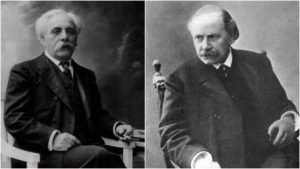
A Look at Jules Massenet & Gabriel Fauré’s ‘Greek’ Operas
By David SalazarJules Massenet and Gabriel Fauré were born on the same day three years apart. May 12, 1842, brought us the former and three years later, his impressionist counterpart was born.
The two were prominent French composers of their time, though one is better known for his orchestral works and the other for his opera. Fauré did compose two operas and they share some commonalities with some of Massenet’s. The most common thread? Greek Mythology.
Massenet’s body of work is rather expansive with the composer taking on famous works of literature (“Manon,” “Le Cid,” “Don Quichotte”), biblical narratives (“Hérodiade”) historical figures (“Cleopâtre”), legends (“Esclaramonde,” “Amadis”), fairy tales (“Cendrillon”) and even more contemporary themes. But like Fauré, he embraced Greek mythology for a few of his works.
Here is a look at each opera composed by Fauré and Massenet with mythological components.
Prométhée (Fauré)
The first work by Fauré received its world premiered in 1900. The opera centers on Prometheus delivering the gift of fire to the mortals and his subsequent punishment. An interesting feature of this opera is that some parts are spoken and some are sung. Prométhée, Pandore, and Hermès are all spoken roles while the remaining characters, including the god Hephaïstos, are sung.
Pénélope (Fauré)
Yet another Greek myth that Fauré appropriated for his second opera, which received its first performance in 1913. This opera was essential to the composer’s output for numerous reasons. Unlike many orchestral works, which saw him delegate orchestration duties to one of his students, the composer actually did all the orchestration during the summer between 1907 and 1912. Inevitably he would have to get assistance when he fell behind in the composition, bringing on Fernand Pecoud. The opera follows the trials and tribulations of Pénélope as she awaits the return of her husband Ulysses to Ithaca.
Ariane (Massenet)
The five-act opera received its world premiere in 1906 in Paris. The opera was popular during Massenet’s lifetime and even inspired this quote from Fauré: “ “Ariane, a noble, great and moving work…” The work has been rarely heard these days but it follows the tale of two sisters Phèdre and Ariane, who are both in love with Theseus. He chooses the former but she is killed and Ariane travels to the underworld to beg for her sister’s resurrection. She manages the feat but then Theseus must again choose between the two. He makes the same choice and leaves Ariane stranded on Naxos.
Bacchus (Massenet)
The “sequel” to “Ariane” premiered in Paris in 1909. This opera sees Ariane follow the demi-god Bacchus to ancient India, believing him to be Theseus. She ultimately sacrifices herself for humanity and Bacchus becomes a God. There has never been a modern performance or single recording of any excerpt from this rarest of operas. Like “Ariane,” soprano Lucienne Bréval sang the role of Ariane at the world premiere.


